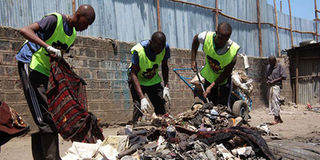The time for youth to take charge is now

Youth group Wapole Kijee help clean-up Majengo slum, Nairobi, on January 20, 2019. PHOTO | FILE | NATION MEDIA GROUP
What you need to know:
- As the projections spell doom, it is time for the Kenyan youth to consider restructuring their aspirations to fit their reality.
- Maybe this is the time for Kenyan youths of different walks of life and tribes to come together and say enough is enough, and work together.
When it rains, it pours, and this is true of the state of the Kenyan economy in 2020.
At the beginning of the year, Central Bank Governor Patrick Njoroge estimated that Kenya would enjoy a 6.2 per cent GDP growth, with agriculture a major booster. But that was before Covid-19.
Now the World Bank is predicting that in 2020, Kenya’s projected growth stands at 1.5 per cent and might even go down to one per cent if the locust invasion and other non-Covid-19 issues are taken into consideration.
For the Kenyan youth, though, who make up 70 per cent of the population, those numbers don’t mean much. Even with last year’s 5.9 per cent economic growth, a third of all the young people eligible for jobs were jobless, while the majority of those who got jobs worked in the informal sector.
The job market has been shrinking since 2012. When the youth asked President Uhuru Kenyatta and his deputy, William Ruto, to explain the worrying trend, they directed these future leaders to the Jubilee portal, where they would find the jobs the government had created.
It is against this sombre scenario that the Covid-19 pandemic has found the Kenyan youth - unemployed, underemployed or jobless.
As the projections spell doom, it is time for the Kenyan youth to consider restructuring their aspirations to fit their reality.
DEVOLUTION
Gone are the days when cities were a sure source of income for migrants from rural areas. Now the cities are becoming uninhabitable even for their inhabitants.
Companies are shutting down; others are retrenching. Nairobi, Kisumu and Mombasa are no longer Canaan.
Devolution is the wake-up call for the youth to create employment in the counties. Kitui set the pace by opening up a garment factory.
Makueni has milk and mango-processing plants. Meru, Embu and Nyandarua counties are all good producers that would do well with value-addition factories or start-ups.
These forgotten counties might be the new Canaan for the Kenyan youth. Young people do not just need devolution to work for their own sake; it may be the saving grace for the Kenyan economy.
But even as the youth restructure their lives to make it through these tough times, there is also the realisation that our Tomorrow has come.
WORK TOGETHER
We can no longer wait to fight for 30 per cent of government tenders and jobs, and neither can we wait for the ministry in charge to lead us.
When you make up 70 per cent of a population, that is a majority, and democracy is the rule of the majority.
Gone also are the days when the only role of the youth was to be ferried to rallies to play audience while politicians insult their counterparts.
The youth should not be sold for agendas. They should be the agenda. Maybe this is the time for Kenyan youths of different walks of life and tribes to come together and say enough is enough, and work together.
The author comments on social issues; [email protected]





